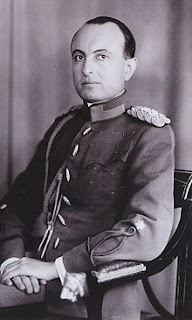Eighty years ago, the next Balkan domino wobbles
The Luftwaffe scaled up its bombing raids on British cities, even though its forces were being redeployed from France to the Balkans. Some crews were flying multiple sorties in a night. The Germans had developed tactics to defeat the first methods that the British had used to frustrate the electronic beam navigation systems such as setting false targets, but their most effective practice was to bomb port cities which were far easier to identify visually at night. Inland cities were only attacked on moonlit nights. Cardiff, Clydebank, Portsmouth, Plymouth, Merseyside and Bristol all suffered badly. Casualties were mercifully light but huge damage was done to the housing stock. The effectiveness of the bombing was due in part to the deployment of heavy bombs up to 2,500kg with a far higher explosive fill ratio than the RAF used.
With British land intervention in support of Greece and German intervention in support of Italy imminent, Mussolini ordered a final attempt by the Italian army to break though into Greece by its own efforts. He went to the front line in person to witness the opening of the offensive. Any hope that he might have had to be rewarded with an Italian victory after months of uninterrupted defeat were to be shattered. Attacks in division strength were sustained over a number of days, but all were defeated with heavy losses. The Italian army suffered over 10,000 casualties
The dismantling of the Italian empire in East Africa continued. This time the target was British Somaliland which had been abandoned to the Italians at the time of the French collapse in May the previous year. The territory had little strategic value but it was felt as acutely shameful that it had been given up without a fight. Under Operation Appearance some 3,000 mainly Indian troops sailed from Aden in a flotilla of warships. They landed successfully at the port of Berbera with minimal casualties. The Italians had been expecting an attack and, like the British in 1940, withdrew.
The next target of
the German diplomatic offensive in the Balkans was Yugoslavia. The Regent,
Prince Paul, was an anglophile – he had been educated at Oxford; was a close
friend of diarist and MP Chips Channon; his wife was sister to the Duchess of
Kent – but he had to face the military reality that Germany was by far the
dominant power in the region. The Regent was summoned to the Berghof and given
an ultimatum to join the Axis. Alert to the Regent’s weakness, Churchill christened
him “Palsy” to the concealed fury of Channon, who was still a member of the government. His friendship with Paul was by then his only qualification for his work.



Comments
Post a Comment